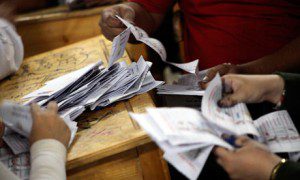The presidential election in May was the last thread of hope for millions of Egyptians. The following report was written right after the first round of elections. Most recently, Egypt’s election commission has delayed Thursday’s planned announcement of the results from a run-off vote between Ahmed Shafiq, the former prime minister, and Mohammed Morsi, the Muslim Brotherhood candidate amidst complaints of campaign violations and disputed
voter counting.
The following report was written after the first round the presidential election, and though the story is fluid and changing from minute-to-minute, it’s important to know the candidate breakdowns and where they all are coming from (pro and anti-revolution).
Candidate Breakdowns
The first of the pro-revolution candidates was Khaled Ali, a lawyer, labor activist and the former head of the Egyptian Center for Economic and Social Rights (ECESR).
One of the most popular candidates, especially with youth, was Dr. Abol Fotoh, a physician and secretary general of the Arab Medical Union who was heavily involved in relief efforts to Palestine for the past 20 years and is a former member of the Muslim Brotherhood and its Guidance Bureau. Another extremely popular figure was Hamdein Sabbahy, the leader of the Nasserist Dignity party. Other candidates included the well-respected Judge Hesham Bastawesy and Dr. Muhammad Selim al-Awwa, a lawyer and the head of the Egyptian Association for Culture and Dialogue.
The last of the pro-revolution candidates was the Muslim Brotherhood’s candidate Dr. Mohamad Morsy, a college professor and the leader of the MB’s Freedom and Justice Party.
The first of the two ex-regime candidates was Amr Moussa, a former Foreign Affairs Minister of the Mubarak era and the former Secretary General of the League of Arab States. The second was Ahmad Shafiq, an Aviation Minister and the last Prime Minister appointed by Mubarak during the early days of the revolution in an attempt to symbolize change.
A Shocking First Election Round
The results of the first round produced a wave of disbelief and confusion, as Morsy came first with 5.7 million votes and Shafiq followed with 5.5 million votes, while the two major revolutionary figures — Hamdein and Dr. Abol Fotoh — came in third and fourth respectively. Reactions of Egyptians at the results ranged from disappointment and rage to a frantic fear that the revolution was being hijacked.
Behind the unexpected high votes for Shafiq are the Coptic votes, as he capitalized on their fears of the MB’s fast rise in the parliament and possibility of an Islamic state; Shafiq evidently focused his campaign on asserting that Egypt would not turn into an Islamic state under his rule. However the main reason behind Shafiq’s 5.5 million votes is believed to be Mubarak’s dismantled National Democratic Party (NDP) whose members found Shaqif’s run for president to be the perfect opportunity to re-gain access to
political life through a familiar face.
There is strong evidence that many NDP members funded Shafiq’s campaign and actively bought votes for his support. Meanwhile, allegations surfaced that the Interior Ministry handed out close to one million voting cards to Egyptian soldiers to vote for Shafiq, which is a major campaign violation.
Despite the intense heat and warnings of sun stroke, hundreds of protesters headed to Tahrir Square, declaring their dissatisfaction
with the results of the first round of presidential elections and demanding the disqualifications of Ahmed Shafiq before mid-June’s runoff. Protesters chanted, “If Shafiq is in the second round, then the Revolution will also begin its second round!”
Many Egyptians believe that the elections were rigged by SCAF, as there is strong evidence of vote buying and tampering with results. This theory is gaining popularity, as Egyptians are enraged at SCAF for their refusal to edit Article 28 of the constitutional decree, which stipulates that all decisions made by Supreme Presidential Electoral Commission (SPEC) are irreversible, hence strengthening the belief that the elections were rigged and that the announced election results by SPEC. and the ensuing decision regarding appeals, are dishonest. Many feel that SCAF has no authority or right to rule Egypt, as they were chosen by Mubarak before stepping down and are clearly carrying on with his agenda and working for his best interests.
What Happens Now to the Egyptian Revolution
More than ever, Egyptians are now demanding the implementation of the Political Disenfranchisement Law, which bans all members of the Mubarak regime from entering into political life. Another reason why Shafiq is strongly tied to the ex-regime is because of an epic day known as the Battle of the Camel, which took place on February 2, 2011, where thugs (hired by the Mubarak regime) entered Tahrir Square on camels and killed 11 while injuring hundreds of protesters.
Shafiq, who was the country’s prime minister at that time, appeared in the media the next day announcing that those were not thugs but people who decided to celebrate the revolution and that a fight simply erupted between them and some of the revolutionaries. This denial and clear attempt to cover up Mubarak’s attempted massacre of his own people made Egyptians feel that Shafiq was partially to blame for the massacre. Those thugs were later cleared of all charges in court, another sign that the Mubarak regime is still in existence and has control over many institutions.
The big question now is who to vote for in the runoffs — the Muslim Brotherhood’s Morsy or the Mubarak-era Ahmad Shafiq. (At publication time, the runoff elections are done and elections results have been delayed.) While it seems clear that Shafiq ought to be eliminated as a choice, many are not comfortable with election of Morsy, as the MB is now seen in a negative light by many. The MB’s popularity has been declining with the shift in their attention in the last year from politics since they gained a majority in the parliament. Many felt that the MB made a deal with SCAF at the expense of their fellow revolutionaries. The Brotherhood was a strong fraction of the revolutionaries; they had a strong presence in Tahrir and made major contributions in the field hospitals whenever demonstrations erupted, the last of which were weeks before elections.
Millions plan to ensure that Shafiq does not make it to the presidential palace by voting for Morsy, even if they are not entirely pleased with the MB’s performance and decisions in the past. Others are seriously considering boycotting the runoffs all together as they refuse to be forced to choose between two candidates who do not represent them.
Egyptian revolutionaries (like myself) agree on the need to re-charge, and we accept the fact that remnants of the corrupt Mubarak regime are still lurking around, waiting for a chance to re-surface. None of this deters us. The revolution will go on!
Lamia El-Sadek is a political and human rights activist who works in the field of development and aid for the most marginalized. She was involved in the Egyptian Revolution since its first days and has since organized many sessions on raising political awareness in post-revolution Egypt. She is an advisor to one of the presidential candidates.















